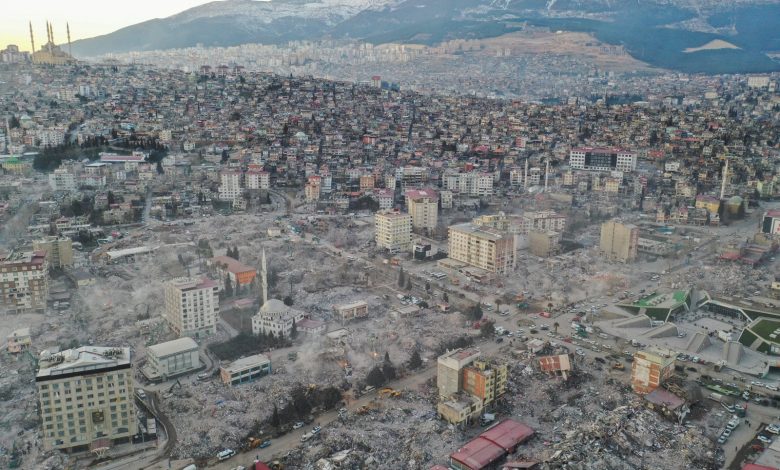‘Stand up again’: Türkiye vows swift post-quake reconstruction

President Recep Tayyip Erdoğan on Tuesday pledged to swiftly rebuild the southeastern region devastated by last week’s catastrophic earthquakes, as he vowed to press on with rescue and recovery efforts.
Two 7.7 and 7.6 magnitude quakes and powerful aftershocks ripped through 10 Turkish provinces on Feb. 6, and severely hit neighboring Syria, flattening or damaging thousands of buildings and destroying roads and other infrastructure.
Erdoğan announced more than 35,400 people had died so far in what he referred to as “the disaster of the century.” The death toll is almost certain to rise even further as search teams turn up with more bodies, and the window for finding survivors is closing.
Confirmed deaths passed those recorded from the massive Erzincan earthquake in 1939 that killed around 33,000 people.
Over 105,500 have been injured, and more than 13,000 are still being treated in hospitals, Erdoğan told a televised address in Ankara following a five-hour Cabinet meeting held at the headquarters of the Disaster and Emergency Management Authority (AFAD).
“We are facing one of the greatest natural disasters, not only in our country, but also in the history of humanity,” Erdoğan said.
“The disaster, which occurred in an area larger than the entire territory of many countries in the world, took place at a short distance from the surface, 7 kilometers (4.3 miles), multiplying the destruction (it caused) compared to other major earthquakes in history,” he said.
“These successive earthquakes released energy equivalent to hundreds of the most powerful atomic bombs. Any country would face issues we did during such a disaster,” he noted.
Need ‘stricter rules’
Yet, Erdoğan vowed authorities would continue rescue missions “until we remove the last citizen under collapsed buildings.”
The 10 quake-affected provinces are home to some 13.5 million people, or 15% of Türkiye’s population. The region accounts for close to 10% of the country’s gross domestic product (GDP).
Erdoğan said 47,000 buildings, which contained 211,000 residences, had been destroyed or were so badly damaged as to require demolition.
He said 98% of all the buildings destroyed were built before 1999, when a massive quake hit Türkiye’s Marmara region, killing 18,000 people and later resulting in new tougher, quake-resistant building codes.
Erdoğan said “collapsed buildings reminded the government of the need for stricter construction rules,” as authorities continued targeting contractors allegedly linked with toppled buildings. Tens of builders have already been arrested, while warrants have been issued for dozens of others.
Justice Ministry announced the establishment of Earthquake Crimes Investigation bureaus to identify contractors and others responsible for building works. It would gather evidence, instruct experts including architects, geologists and engineers, and check building permits and occupation permits.
More than 2.2 million people have left the worst-hit areas already, Erdoğan said, and hundreds of thousands of buildings have become uninhabitable. He informed that the shelter needs of a total of 1.6 million survivors had been met.
More than 175,000 tents and 5,400 containers were set up in the earthquake-affected zone, he noted.
“We will rebuild all the houses and workplaces, destroyed or made uninhabitable by the earthquake, and hand them over to the rightful owners,” he added.
Reconstruction to start in March
Damage assessment of buildings will be completed in a week and reconstruction will begin as soon as next month, he noted.
Erdoğan announced that the government planned to start the construction of 30,000 houses in March. He has said the state will complete housing reconstruction within a year, and was preparing a program to “lift the country stand once again.”
The Environment, Urbanization and Climate Change Ministry and Housing Development Administration (TOKI) will launch preparations for new houses and cities to be built in the region, he said.
“Our aim is to complete the construction of high quality and safe buildings in a year to meet the housing needs in the entire earthquake-affected zone.
In southern Hatay province, half of the buildings have either collapsed, been heavily damaged, or need to be demolished quickly, said Interior Minister Süleyman Soylu on Wednesday.
The government encouraged those in quake-hit areas whose buildings have been deemed safe to return home.
“We want citizens to track their buildings’ status on the online system and get back into the buildings which receive the safety tag from the urbanization ministry, in order to start getting back to normal,” Culture and Tourism Minister Mehmet Nuri Ersoy told a news conference in Malatya, some 160 kilometers from the epicenter of the earthquake.
“We will quickly demolish what needs to be demolished and build safe houses,” Environment, Urbanization and Climate Change Minister Murat Kurum tweeted.
The earthquake’s impact on GDP is unlikely to be as impactful as after the 1999 earthquake in northwest Türkiye, which struck the industrial heartland, IMF Executive Director Mahmoud Mohieldin said on the sidelines of the Arab Fiscal Forum on Sunday.
Mohieldin added that, after the initial impact over the next few months, public and private sector investments in rebuilding could boost GDP growth going forward.
Nonetheless, economists and officials estimated the quake would cut economic growth by up to two percentage points this year. The government forecast growth at 5% in 2022 and had estimated growth at 5.5% in 2023 before the quake.
A report published at the weekend by the Turkish Enterprise and Business Confederation (TÜRKONFED) put the cost of the damage at $84.1 billion – $70.8 billion from the repair of thousands of homes, $10.4 billion from loss of national income and $2.9 billion from loss of working days.
It said the main costs would be rebuilding housing, transmission lines and infrastructure; and meeting the short, medium and long-term shelter needs of the hundreds of thousands left homeless.
A three-month state of emergency has been declared in the 10 provinces affected, and the central bank has postponed payments on some loans. The Treasury declared force majeure until the end of July and postponed tax payments for the region.
Erdoğan said Türkiye was utilizing all the aid packages extended to AFAD at home and from abroad, amounting to TL 8.3 billion (approximately $440 million) for the time being.
“As cabinet members and government officials who attended the cabinet meeting, we have decided to donate a total of TL 136.58 million to AFAD for earthquake victims. Now it is time to heal wounds, alleviate pain, rebuild what has been destroyed, and make millions of our people cling to life,” he added.





